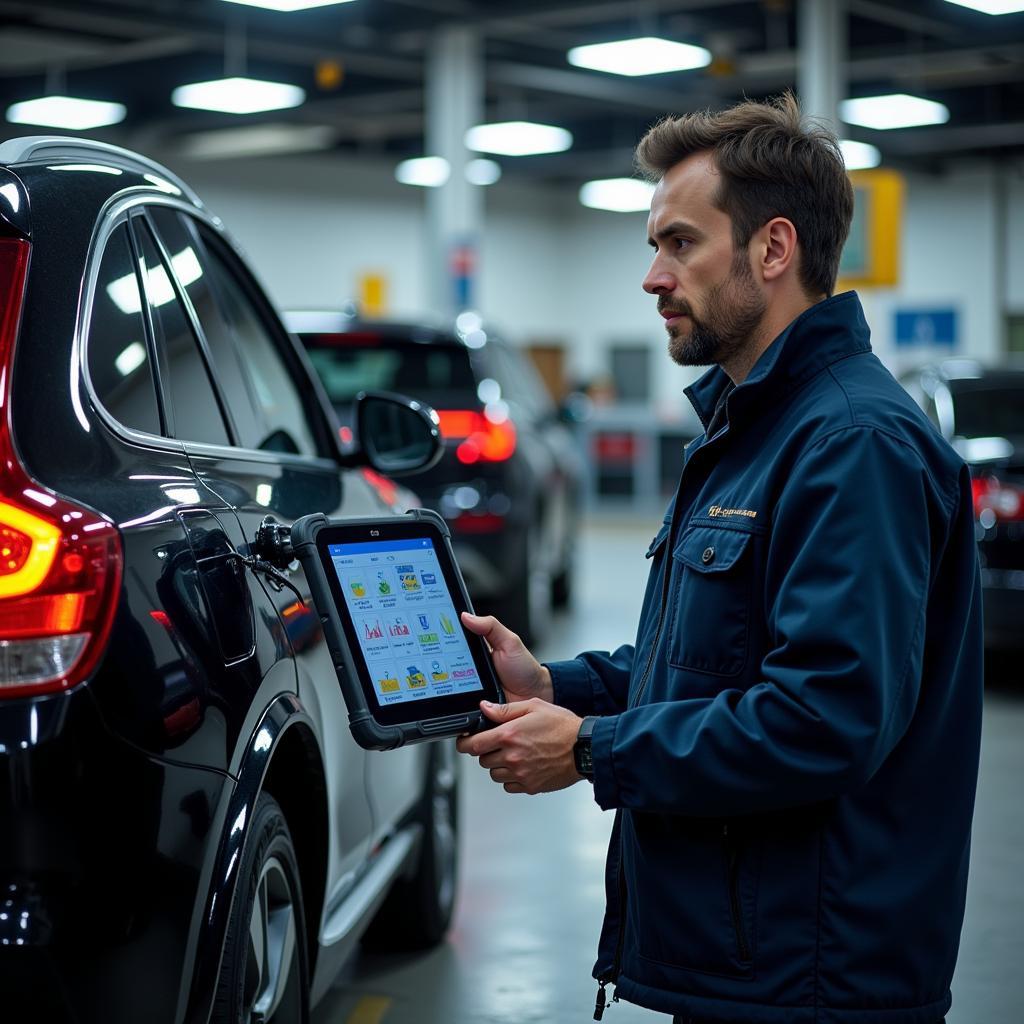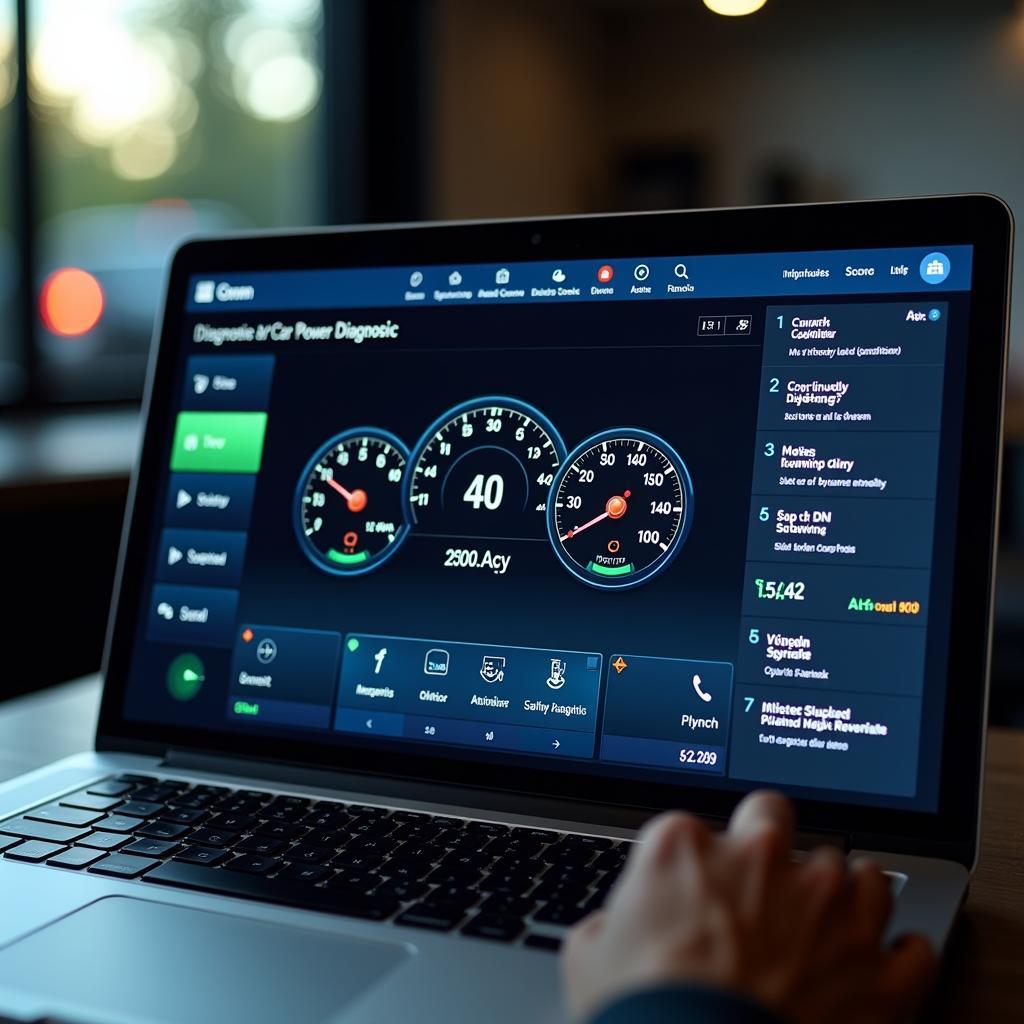A Portable Car Diagnostic Machine is an essential tool for any mechanic, whether you’re a seasoned professional or a DIY enthusiast. These compact devices empower you to identify and diagnose vehicle issues with speed and accuracy, saving you time and money in the long run.
 Mechanic Using a Portable Car Diagnostic Machine
Mechanic Using a Portable Car Diagnostic Machine
Why You Need a Portable Car Diagnostic Machine
Gone are the days of relying solely on experience and intuition to troubleshoot car problems. Modern vehicles are complex machines, controlled by intricate electronic systems. A portable car diagnostic machine acts as your window into these systems, revealing hidden issues that would otherwise be impossible to detect.
Here are just a few reasons why investing in a portable car diagnostic machine is a smart move:
- Accurate Diagnosis: Pinpoint the root cause of engine issues, transmission problems, airbag malfunctions, ABS issues, and more.
- Time Savings: Avoid lengthy and costly trial-and-error troubleshooting by getting straight to the source of the problem.
- Cost-Effectiveness: Identify issues early on, preventing minor problems from escalating into major (and expensive) repairs.
- DIY Empowerment: Take control of your vehicle’s maintenance and repairs without relying solely on mechanics.
Choosing the Right Portable Car Diagnostic Machine: Key Features to Consider
Navigating the world of car diagnostic machines can be overwhelming, especially with the wide array of options available. Here’s a breakdown of essential features to look for when making your decision:
1. Vehicle Compatibility:
- Ensure the machine is compatible with the make, model, and year of your vehicle (or the vehicles you typically work on).
- Look for OBD-II and CAN (Controller Area Network) compliance for compatibility with most modern cars.
2. Diagnostic Capabilities:
- Consider the range of systems the machine can diagnose, such as engine, transmission, ABS, airbags, and more.
- Look for features like live data streaming, which allows you to monitor sensor readings in real time.
3. User Interface and Software:
- Opt for a machine with an intuitive user interface and easy-to-understand software.
- Consider whether the device offers software updates to keep up with the latest vehicle models and diagnostic protocols.
4. Additional Features:
- Some machines offer advanced features like bi-directional control (allowing you to activate vehicle components for testing), printing capabilities, and internet connectivity for software updates and data logging.
Understanding the Different Types of Portable Car Diagnostic Machines:
1. Code Readers:
- Entry-level devices that can read and clear basic diagnostic trouble codes (DTCs).
- Affordable and suitable for DIY enthusiasts looking to diagnose simple issues.
2. Scan Tools:
- Offer more advanced functionality than code readers, including the ability to view live data streams and perform some actuation tests.
- Suitable for both DIYers and professionals who require more in-depth diagnostic capabilities.
3. Professional-Grade Scanners:
- The most comprehensive and expensive type of car diagnostic machine.
- Offer a wide range of features, including advanced coding and programming capabilities, bi-directional control, and access to manufacturer-specific data.
car diagnostics machine for sale
Making the Most of Your Portable Car Diagnostic Machine: Tips and Tricks
Here are a few pointers to maximize the effectiveness of your new diagnostic tool:
- Read the Manual: Familiarize yourself with the machine’s features, functions, and software.
- Start with the Basics: Begin by learning how to read and clear DTCs before diving into more advanced features.
- Use Reliable Resources: Consult reputable online forums, repair manuals, and manufacturer websites for guidance and information on specific error codes.
- Keep Software Updated: Regularly update the machine’s software to ensure compatibility with the latest vehicle models and diagnostic protocols.
 Modern Car Diagnostic Software Interface on Laptop
Modern Car Diagnostic Software Interface on Laptop
Conclusion: Empower Yourself with a Portable Car Diagnostic Machine
Investing in a portable car diagnostic machine can be a game-changer for anyone who owns, maintains, or repairs vehicles. These powerful tools provide the insights needed to diagnose issues accurately, saving time, money, and frustration in the long run. Whether you’re a seasoned mechanic or a DIY enthusiast, a portable car diagnostic machine is an invaluable asset to have in your toolkit.
FAQs About Portable Car Diagnostic Machines
1. Will a portable car diagnostic machine work on my car?
Most portable car diagnostic machines are compatible with vehicles manufactured after 1996 that are equipped with an OBD-II port. However, it’s essential to check the machine’s specifications to ensure compatibility with your specific make, model, and year.
2. Can I use a portable car diagnostic machine to program car keys?
Some advanced professional-grade scanners offer key programming capabilities, but this feature is not available on all models.
3. How often should I update the software on my car diagnostic machine?
It’s recommended to check for software updates regularly, ideally every few months, to ensure compatibility with the latest vehicle models and diagnostic protocols.
4. What’s the difference between a code reader and a scan tool?
Code readers can read and clear basic diagnostic trouble codes (DTCs), while scan tools offer more advanced functionality, such as viewing live data streams and performing actuation tests.
5. Can a portable car diagnostic machine fix my car?
No, a car diagnostic machine is a diagnostic tool, not a repair tool. It helps you identify the root cause of a problem but does not physically fix it.
Need expert guidance on choosing the right portable car diagnostic machine? Contact us today for personalized assistance. Our team is available 24/7 via WhatsApp: +1(641)206-8880.

Leave a Reply